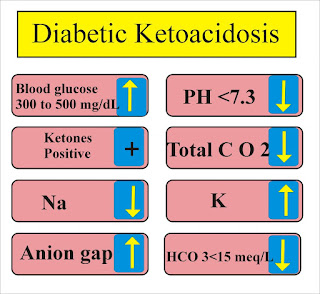SIGNS & SYMPTOMS
Diabetes symptoms vary depending on how much your blood sugar is elevated. Some people, especially those with prediabetes or type 2 diabetes, may not experience symptoms initially. In type 1 diabetes, symptoms tend to come on quickly and be more severe.
Some of the signs
and symptoms of type 1 and type 2 diabetes are:
·
Increased
thirst
·
Frequent
urination
·
Extreme
hunger
·
Unexplained
weight loss
· Presence of ketones in the urine (Ketones are a by-product of the breakdown of muscle and fat that happens when there's Not enough available insulin)
· Fatigue
·
Irritability
·
Blurred
vision
·
Slow-healing
sores
·
Frequent
infections, such as gums or skin infections and vaginal infections
Although type 1
diabetes can develop at any age, it typically appears during childhood or
adolescence. Type 2 diabetes, the more common type, can develop at any age,
though it's more common in people older than 40.
Prediabetes develops when your body begins to have
trouble using the hormone insulin. Insulin
is necessary to transport glucose—what your body uses for energy—into the cells
via the bloodstream. In pre-diabetes, your body either doesn’t make enough
insulin or it doesn’t use it well (that’s called insulin resistance).
If you don’t have enough insulin or if you’re insulin resistant, you can build up too much glucose in your blood, leading to a higher-than-normal blood glucose level and perhaps prediabetes.
To understand diabetes, first you must understand how glucose is normally processed in the body.
How insulin works?
Insulin
is a hormone that comes from a gland situated behind and below the stomach
(pancreas).
·
The pancreas secretes insulin into the bloodstream.
·
The insulin circulates, enabling sugar to enter your
cells.
·
Insulin lowers the amount of sugar in your bloodstream.
·
As your blood sugar level drops, so does the secretion
of insulin from your pancreas.
The role of glucose:
Glucose
— a sugar — is a source of energy for the cells that make up muscles and other
tissues.
·
Glucose comes from two major sources: food and your
liver.
·
Sugar is absorbed into the bloodstream, where it enters
cells with the help of insulin.
·
Your liver stores and makes glucose.
· When your glucose levels are low, such as when you haven't eaten in a while, the liver
breaks down stored
glycogen into glucose to keep your glucose level within a normal range.
ü
Causes of type 1 diabetes:
The
exact cause of type 1 diabetes is unknown. What is known is that your immune
system — which normally fights harmful bacteria or viruses — attacks and
destroys your insulin-producing cells in the pancreas. This leaves you with
little or no insulin. Instead of being transported into your cells, sugar
builds up in your bloodstream.
ü
Causes of prediabetes and type 2 diabetes:
In
prediabetes — which can lead to type 2 diabetes — and in type 2 diabetes, your
cells become resistant to the action of insulin, and your pancreas is unable to
make enough insulin to overcome this resistance. Instead of moving into your
cells where it's needed for energy, sugar builds up in your bloodstream.
ü
Causes of Gestational diabetes:
During
pregnancy, the placenta produces hormones to sustain your pregnancy. These
hormones make your cells more resistant to insulin.
Normally,
your pancreas responds by producing enough extra insulin to overcome this
resistance. But sometimes your pancreas can't keep up. When this happens, too
little glucose gets into your cells and too much stays in your blood, resulting
in gestational diabetes.
ü Genetic Causes of
Diabetes
Genetics play a
strong role in the chances of developing both Type-1 and Type 2
diabetes. The risk of developing diabetes is affected by whether your parents
or siblings have diabetes.
Type 1
diabetes and genetics - average risks
- Mother with diabetes increases risk of diabetes by 2%
- Father with diabetes increases risk of diabetes by 8%
- Both parents with diabetes increases risk by 30%
- Brother or sister with diabetes increases risk by 10%
- Non-identical twin with diabetes increases risk by 15%
- Identical twin with diabetes increases risk by 40%
Type 2
diabetes and genetics - average risks
- If either mother of father has diabetes increases risk of
diabetes by 15%
- If both mother and father have diabetes increases risk by 75%
- If non-identical twin has diabetes increases risk by 10%
- If identical twin has diabetes increases risk by 90%
ü Drug Induced
Diabetes
A number of
medications have side effects which include the raising of blood glucose
levels. Drug induced diabetes is when use of a specific medication has lead to
the development of diabetes.
Certain
toxins such as Vacor (a rat poison) and intravenous pentamidine can permanently
destroy pancreatic β-cells. Such drug reactions fortunately are rare. There are
also many drugs and hormones that can impair insulin action. Examples include
nicotinic acid and glucocorticoids. Patients receiving α-interferon have been
reported to develop diabetes associated with islet cell antibodies and, in
certain instances, severe insulin deficiency.
Which
drugs can induce diabetes?
A number of drugs
have been linked with an increased risk development of Type 2 diabetes.
- Corticosteroids
- Thiazide diuretics
- Beta-blockers
- Antipsychotics
- Statins
ü Diabetic
ketoacidosis
Sometimes
a person's blood sugar level rises greatly before he or she knows
something is wrong. Because insulin isn't available, the cells in the body are
unable to get the sugar (glucose) they need for energy. The body begins to
break down fat and muscle for energy.
When
fat is used for energy, ketones-or
fatty acids-are produced and enter the bloodstream. This causes the chemical
imbalance diabetic ketoacidosis.
This can be a life-threatening condition.







No comments:
Post a Comment